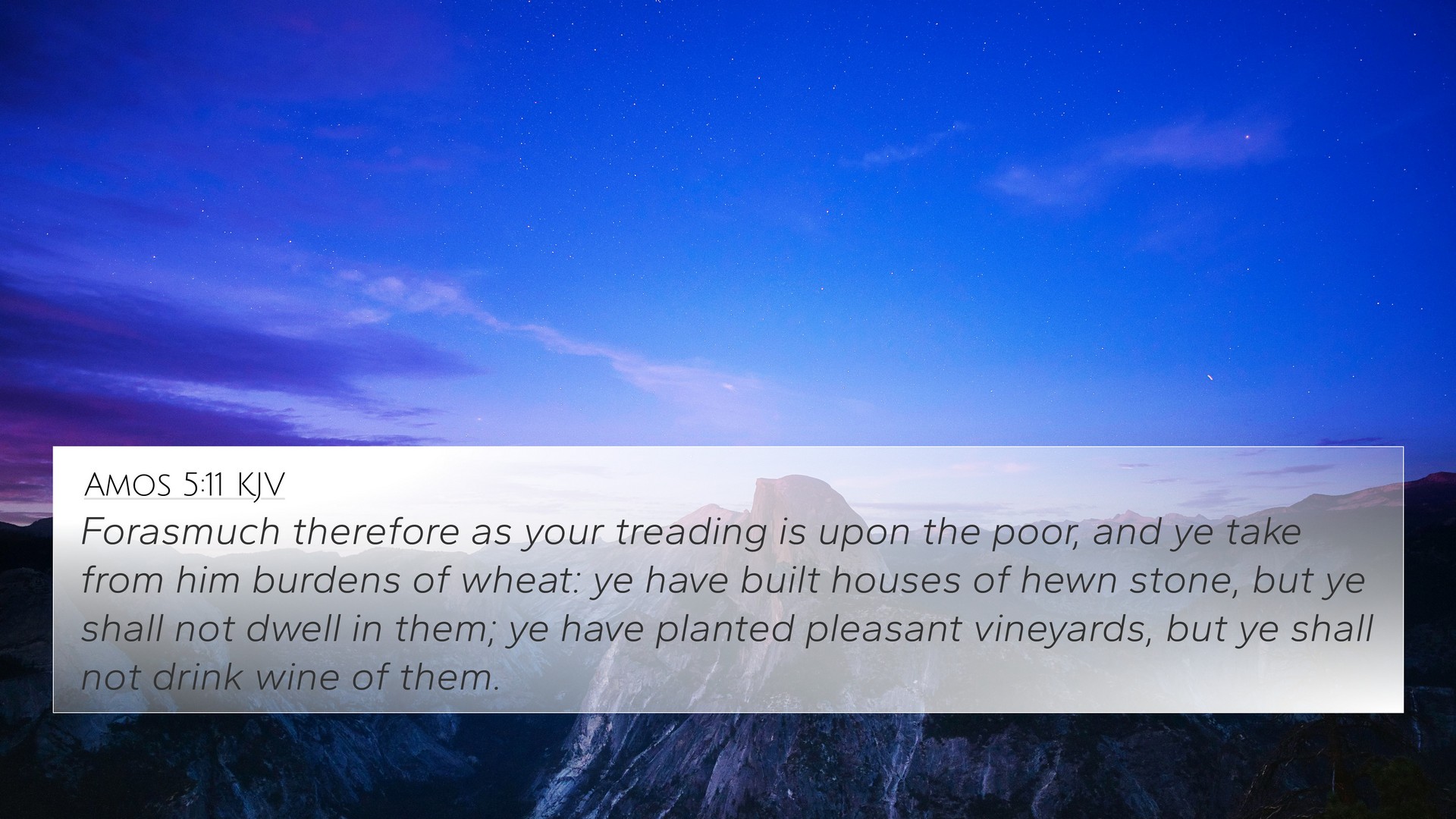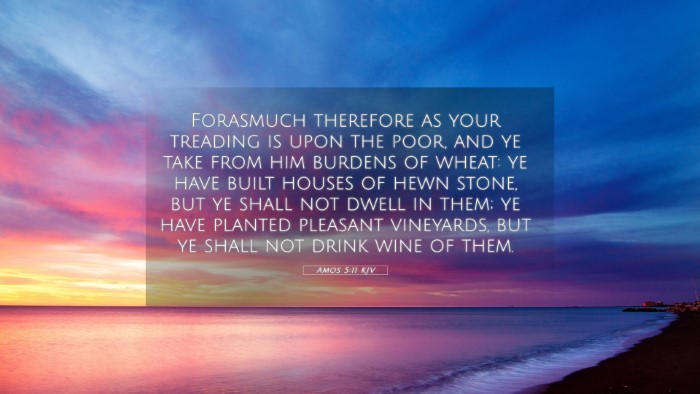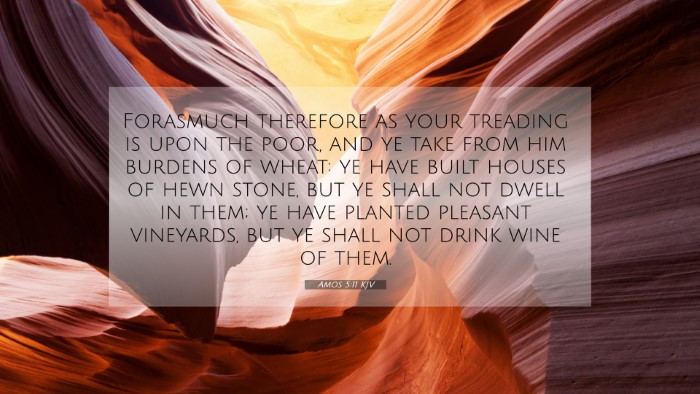Old Testament
Genesis Exodus Leviticus Numbers Deuteronomy Joshua Judges Ruth 1 Samuel 2 Samuel 1 Kings 2 Kings 1 Chronicles 2 Chronicles Ezra Nehemiah Esther Job Psalms Proverbs Ecclesiastes Song of Solomon Isaiah Jeremiah Lamentations Ezekiel Daniel Hosea Joel Amos Obadiah Jonah Micah Nahum Habakkuk Zephaniah Haggai Zechariah MalachiAmos 5:11 Similar Verses
Amos 5:11 Cross References
Forasmuch therefore as your treading is upon the poor, and ye take from him burdens of wheat: ye have built houses of hewn stone, but ye shall not dwell in them; ye have planted pleasant vineyards, but ye shall not drink wine of them.
Uncover the Rich Themes and Topics of This Bible Verse
Listed below are the Bible themes associated with Amos 5:11. We invite you to explore each theme to gain deeper insights into the Scriptures.
Amos 5:11 Cross Reference Verses
This section features a detailed cross-reference designed to enrich your understanding of the Scriptures. Below, you will find carefully selected verses that echo the themes and teachings related to Amos 5:11 KJV. Click on any image to explore detailed analyses of related Bible verses and uncover deeper theological insights.

Micah 6:15 (KJV) »
Thou shalt sow, but thou shalt not reap; thou shalt tread the olives, but thou shalt not anoint thee with oil; and sweet wine, but shalt not drink wine.
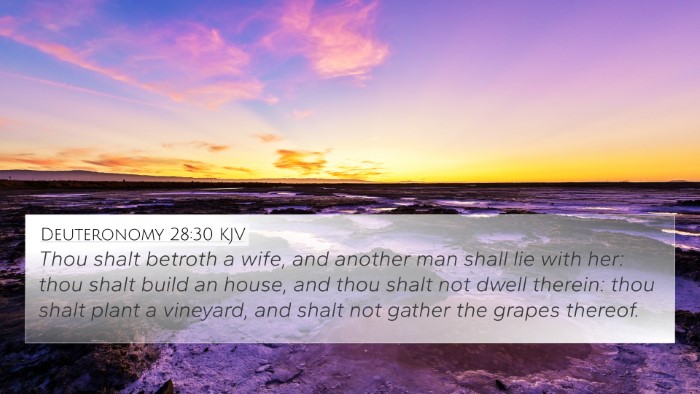
Deuteronomy 28:30 (KJV) »
Thou shalt betroth a wife, and another man shall lie with her: thou shalt build an house, and thou shalt not dwell therein: thou shalt plant a vineyard, and shalt not gather the grapes thereof.
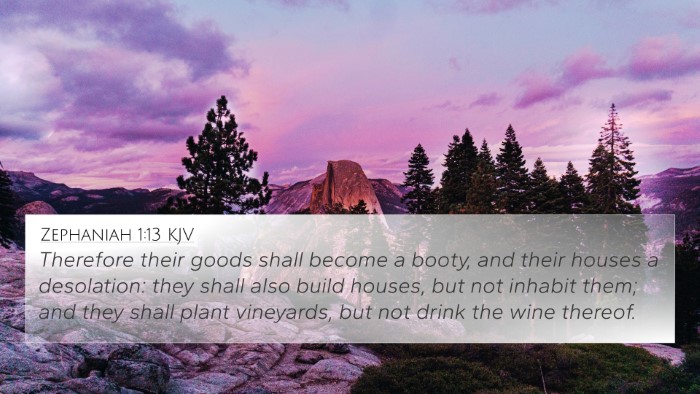
Zephaniah 1:13 (KJV) »
Therefore their goods shall become a booty, and their houses a desolation: they shall also build houses, but not inhabit them; and they shall plant vineyards, but not drink the wine thereof.
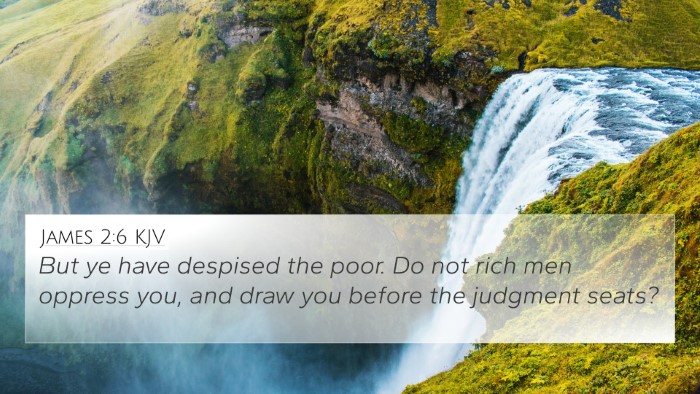
James 2:6 (KJV) »
But ye have despised the poor. Do not rich men oppress you, and draw you before the judgment seats?
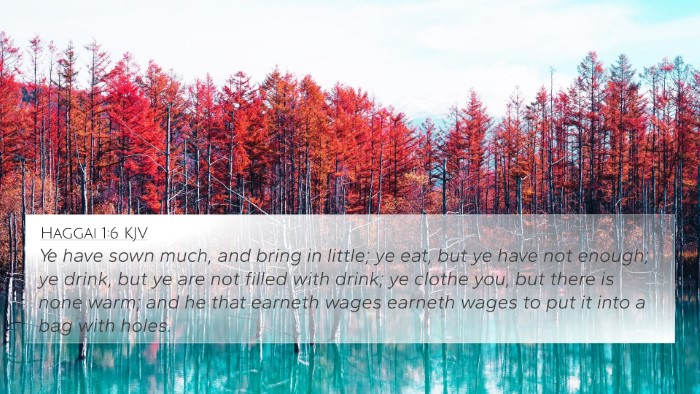
Haggai 1:6 (KJV) »
Ye have sown much, and bring in little; ye eat, but ye have not enough; ye drink, but ye are not filled with drink; ye clothe you, but there is none warm; and he that earneth wages earneth wages to put it into a bag with holes.
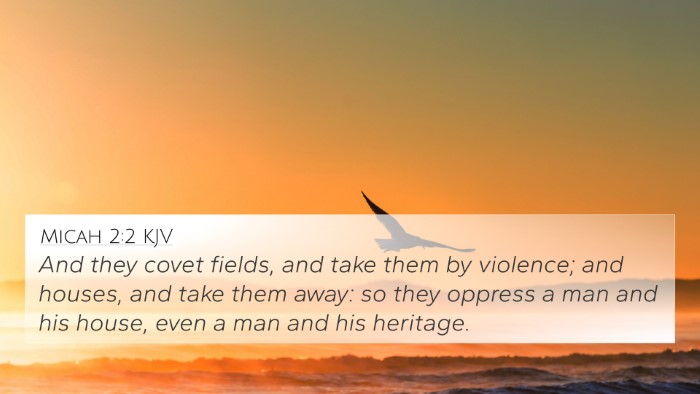
Micah 2:2 (KJV) »
And they covet fields, and take them by violence; and houses, and take them away: so they oppress a man and his house, even a man and his heritage.
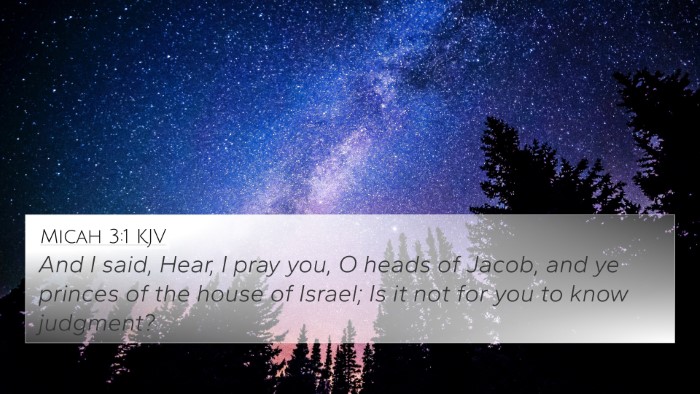
Micah 3:1 (KJV) »
And I said, Hear, I pray you, O heads of Jacob, and ye princes of the house of Israel; Is it not for you to know judgment?
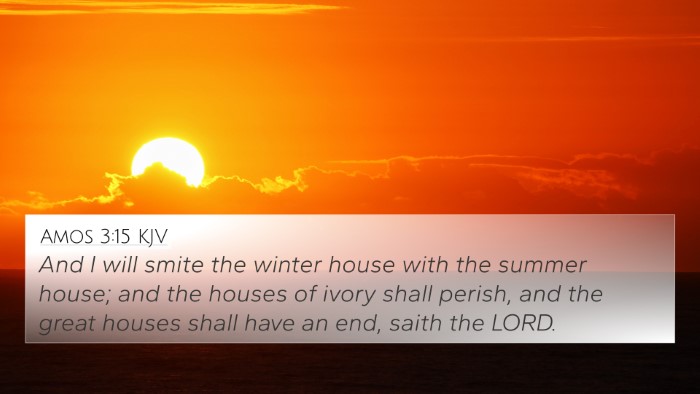
Amos 3:15 (KJV) »
And I will smite the winter house with the summer house; and the houses of ivory shall perish, and the great houses shall have an end, saith the LORD.
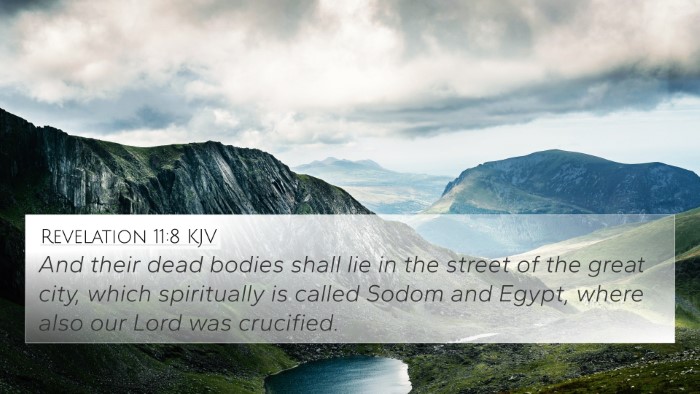
Revelation 11:8 (KJV) »
And their dead bodies shall lie in the street of the great city, which spiritually is called Sodom and Egypt, where also our Lord was crucified.
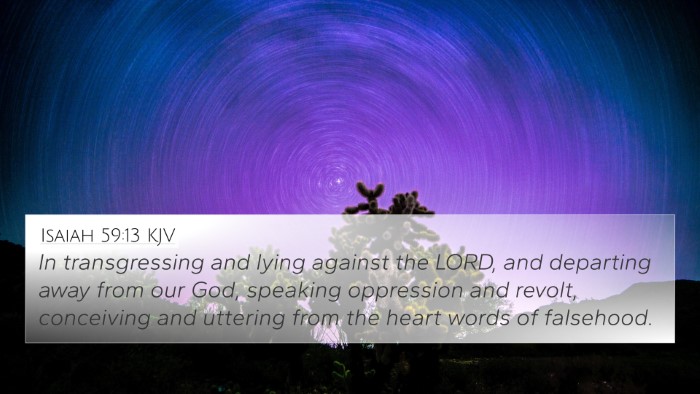
Isaiah 59:13 (KJV) »
In transgressing and lying against the LORD, and departing away from our God, speaking oppression and revolt, conceiving and uttering from the heart words of falsehood.
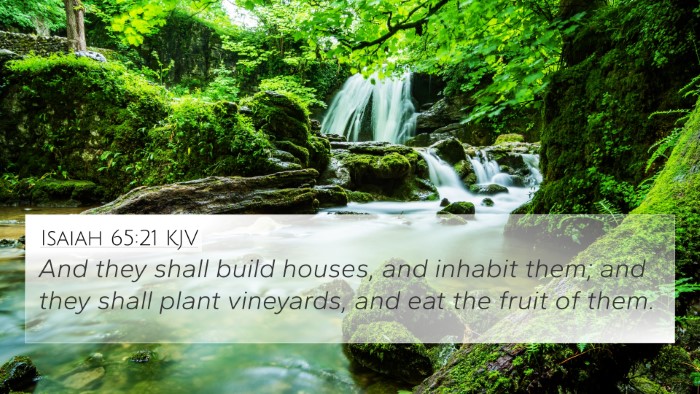
Isaiah 65:21 (KJV) »
And they shall build houses, and inhabit them; and they shall plant vineyards, and eat the fruit of them.
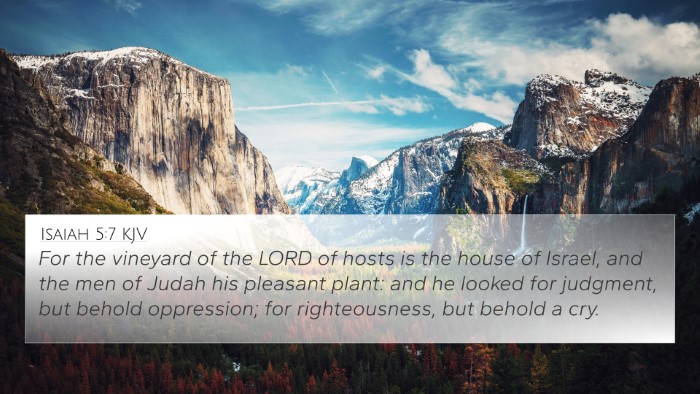
Isaiah 5:7 (KJV) »
For the vineyard of the LORD of hosts is the house of Israel, and the men of Judah his pleasant plant: and he looked for judgment, but behold oppression; for righteousness, but behold a cry.
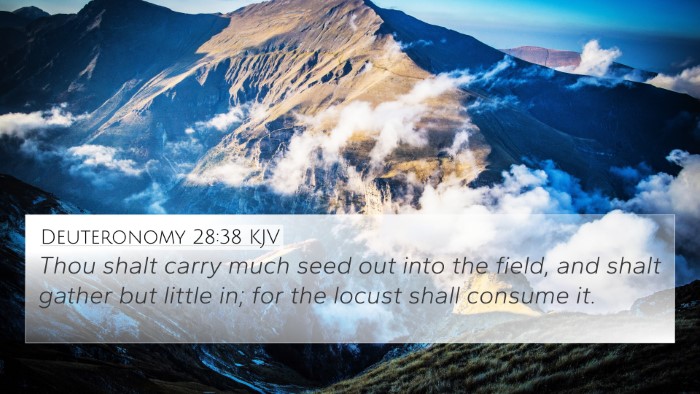
Deuteronomy 28:38 (KJV) »
Thou shalt carry much seed out into the field, and shalt gather but little in; for the locust shall consume it.
Amos 5:11 Verse Analysis and Similar Verses
Amos 5:11 - Understanding the Verse
Amos 5:11 reads:
"Forasmuch therefore as your treading is upon the poor, and ye take from him burdens of wheat: ye have built houses of hewn stone, but ye shall not dwell in them; ye have planted pleasant vineyards, but ye shall not drink wine of them."
This verse serves as a profound indictment against the social injustices and moral failings of the people of Israel during the time of Amos’ prophecy. It underscores a theme of divine judgment on those who exploit the vulnerable and prioritize material wealth over righteousness.
Summary of Key Insights
- Social Justice: Matthew Henry emphasizes that the oppression of the poor by the wealthy will lead to divine retribution. The treading upon the poor suggests a disregard for their suffering, highlighting the serious moral implications of such actions.
- False Security: According to Albert Barnes, the building of lavish houses and planting of vineyards symbolizes a false sense of security among the Israelites. Their complacency and pride in their possessions obscure the impending judgment and consequences of their actions.
- God's Judgment: Adam Clarke notes that the penalties described—uninhabited houses and unharvested vineyards—are symbolic of the loss of blessings due to their sins. This serves as a warning that earthly comforts provide no protection from divine judgment.
Thematic Connections
The themes presented in Amos 5:11 resonate with various other scriptures within the Bible. This verse invites comparative analysis and encourages a deeper understanding of the interconnected nature of scriptural teachings on social justice, divine justice, and human accountability.
Related Cross-References
- Isaiah 5:8-10: This passage condemns those who accumulate wealth and property at the expense of others, mirroring the themes in Amos.
- Micah 2:1-2: Micah speaks against those who covet fields and take them through unjust means, emphasizing social injustice and its repercussions.
- James 5:1-6: In the New Testament, James warns the rich about the consequences of their exploitation of workers, echoing the messages found in both Amos and Micah.
- Ezekiel 18:30: This verse highlights the need for repentance from injustices and speaks to God’s desire for justice, aligning with the call for righteousness voiced by Amos.
- Proverbs 22:16: The verse warns about oppressing the poor for personal gain, tying directly into the themes of Amos 5:11.
- Job 31:16-22: Job declares his integrity by recounting how he has treated the poor, which is in stark contrast to the behavior condemned by Amos.
- Luke 12:20-21: Jesus tells the parable of a rich man who hoarded wealth; the man’s death suggests the futility of storing treasures on earth.
SEO Keywords Explanation
As we explore the meanings and implications of Amos 5:11, we utilize keywords for enhancing the study of Bible verses:
- Bible verse cross-references: Key insights arise from analyzing passages that relate to social justice and divine consequences.
- Connections between Bible verses: Insights from various prophetic books illustrate a consistent theme regarding God’s justice.
- Linking Bible scriptures: By linking Amos with New Testament teachings, we can see a continuing conversation on moral integrity.
- Comparative Bible verse analysis: Studying Amos alongside Isaiah and Micah provides a richer understanding of prophetic warnings.
- Thematic Bible verse connections: Themes of oppression, divine judgment, and righteousness weave throughout the scriptures, inviting deeper reflection.
Inter-Biblical Dialogue
The dialogue between the Old and New Testament often reveals profound insights when considering verses like Amos 5:11. This intertextual examination not only enhances understanding but also encourages believers to apply these lessons in their lives.
Tools for Cross-Referencing
Using Bible concordances and Bible cross-reference guides can facilitate access to relevant scriptures that illuminate the message of Amos 5:11:
- Own a cross-reference Bible study to see connections visually.
- Use a Bible reference resource to explore thematic links.
- Consider Bible chain references for a guided exploration of interconnected verses.
Conclusion
In summary, Amos 5:11 holds significant implications for understanding God's perspective on injustice and moral failures. The interconnected nature of the Bible illuminates the serious consequences of societal wrongdoing and serves as a timeless reminder of the need for justice, mercy, and repentance. Through careful study and cross-referencing, readers can uncover the richness of the scriptural narrative and apply its lessons to their lives.
